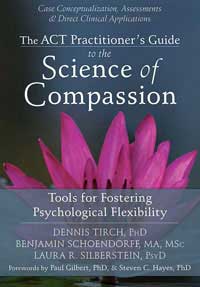 296 pages
296 pages8 CE credits
Course Enrollment
$200.00
Add to Cart
All exams are taken online. The exam for this course will be available in "My Courses" immediately upon enrollment. Note the book is not included.
The book is available for purchase from Amazon.
As an Amazon Associate we receive a rebate from qualifying purchases.
THE ACT PRACTITIONER'S GUIDE TO THE SCIENCE OF COMPASSION
Tools for Fostering Psychological Flexibility
Dennis Tirch, Ph.D, Benjamin Schoendorff, M.A., and Laura Silberstein, Psy.DNew Harbinger Publications, 2014
DESCRIPTION
Acceptance and commitment therapy (ACT) is proven effective in the treatment of an array of disorders, including addiction, depression, anxiety, self-harm, eating disorders, and more. Evidence shows that mindfulness and acceptance exercises help clients connect with the moment, uncover their true values, and commit to positive change. But did you know that compassion focused exercises can also greatly increase clients' psychological flexibility?
More and more, therapists are finding that the act of compassion–both towards oneself and towards others–can lead to greater emotional and physical well-being, increased distress tolerance, and a broader range of effective responses to stressful situations. One of the best advantages of compassion focused methods is how easily they can be integrated into an ACT approach.
An important addition to any ACT professional's library, The ACT Practitioner's Guide to the Science of Compassion explores the emotionally healing benefits of compassion focused practices when applied to traditional acceptance and commitment therapy (ACT). This book offers case conceptualization, assessments, and direct clinical applications that integrate ACT, functional analytic psychotherapy, and compassion focused therapy to enhance your clinical practice.
This is the first book on the market to provide an in-depth discussion of compassion in the context of ACT and other behavioral sciences. The integrative treatment model in this book provides powerful transdiagnostic tools and processes that will essentially build bridges across therapies. If you are ready for a new, easily integrated range of techniques that can be used for a variety of treatment applications, this guide will prove highly useful. And if you are looking to build on your previous experience with cognitive and behavioral therapies, this book will help to enhance your treatment sessions with clients and increase their psychological flexibility.
The reader will be able to:
• Define the evolutionary roots of compassion
• Explain the relation of compassion to psychological flexibility
• Explore the origins of Compassion-Focused Therapy (CFT)
• Analyze techniques of training self-compassion in clinical practice
• Explain how to use the therapeutic relationship to train compassion
• Apply initial elements of a compassion-focused ACT
• Explore how to train the compassionate mind
• Describe case formulation in compassion therapy
• Explain why assessment is essential
• Develop strategies for treatment planning
• Examine the elements involved in completion
AUTHOR
Dennis Tirch, Ph.D, is founder and director of The Center for Mindfulness and Compassion Focused Therapy in New York and the Compassionate Mind Foundation USA. Benjamin Schoendorff, MA, is a licensed psychologist in Quebec, Canada, and founder of the Contextual Psychology Institute. Laura R. Silberstein, PsyD, is a licensed psychologist in New York and New Jersey and is the associate director of The Center for Mindfulness and Compassion Focused Therapy in New York.
EDITORIAL REVIEWSAn elegant synthesis of ancient wisdom and modern science. Packed full of powerful insights and practical tools, this book is an incredibly useful resource not just for acceptance and commitment therapy (ACT) practitioners, but for anyone with an interest in compassion. Highly recommended!
--Russ Harris, author of The Happiness Trap and ACT Made Simple
The ACT Practitioners Guide to the Science of Compassion by Tirch, Schoendorff, and Silberstein is an excellent integration of acceptance and commitment therapy (ACT) and compassion-focused therapy (CFT). User-friendly and filled with insights and clinical examples, this book will open new possibilities in therapy. Highly recommended.
--Robert Leahy, PhD, director of the American Institute for Cognitive Therapy
This is a truly unique book that examines the points of intersection between acceptance and commitment therapy (ACT) and other approaches to mindfulness and self-compassion. While having a remarkable level of detail and theoretical sophistication, the book also provides case examples and easy, practical techniques to help therapists integrate compassion practice into their work with clients in a meaningful way.
--Kristin Neff, PhD, associate professor in educational psychology at the University of Texas at Austin, TX, pioneering researcher into the mental health benefits of self-compassion, and author of Self-Compassion
Compassion is a defining aspect of humanity that contributed to the survival of our species. In addition, compassion is one of the common elements of all world religions and at the heart of clinical practice. In this remarkable volume, Tirch, Schoendorff, and Silberstein examine the many aspects of compassion within the context of modern cognitive behavioral therapy (CBT). Highly accessible, this remarkable book provides clinicians with concrete recommendations to cultivate compassion and implement it into clinical practice. This book is a must-read.
--Stefan G. Hofmann, PhD, professor of psychology at Boston University, MA, and author of An Introduction to Modern CBT: Psychological Solutions to Mental Health Problems
Evolutionary science is providing us with a deeper understanding of the centrality of connection in human well-being. As result, the science of compassion is growing dramatically and compassion is taking a critical place in the study and practice of empirical clinical psychology. Tirch, Schoendorff, and Silberstein provide welcome guidance for clinicians interested in a more explicit focus on compassion in their work.
--Kelly G. Wilson, PhD, associate professor of psychology at the University of Mississippi, MS, and coauthor of Acceptance and Commitment Therapy
ISHK CE at Home
1702-L Meridian Ave., #266
San Jose, CA 95125-5586
This website uses cookies to ensure you get the best experience on our website. Learn more
